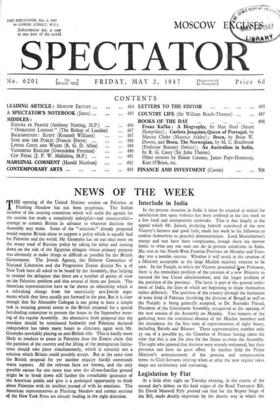Interlude in India
In the present situation in India it must be counted as matter for satisfaction that open violence has been confined in the last week to a few local and unimportant outbreaks. That is due largely to the appeal which Mr. Jinnah, declaring himself convinced of the new Viceroy's fairness and good faith, made last week to his followers to confine themselves to peaceful demonstrations. Lord Mountbatten's energy and tact have been conspicuous, though there are narrow limits to what any one man can do in present conditions in India. His visit to the North-West Frontier Province on Monday and Tues- day was a notable success. Whether it will result in the creation of a Ministry acceptable to the large Muslim majority remains to be seen. In the Punjab, to which the Viceroy proceeded f‘om Peshawar, there is the immediate problem of the creation of a new Ministry to succeed the late Union administration, and the larger problem of the partition of the province. The latter is part of the general settle- ment of India, the lines of which are beginning to shape themselves rather definitely. The partition of the country through the formation of some kind of Pakistan ;involving the division of Bengal as well as the Punjab) is being generally accepted, as Dr. Rajendra Prasad, President of the Constituent Assembly, recognised at the opening of the new session of the Assembly on Monday. Two features of the gathering were the continued absence of the Muslim members and the attendance for the first time of representatives of eight States, including Baroda and Bikaner. These representatives number only is out of a possible 93, the Chamber of Princes having taken the view that this is not the time for the States to enter the Assembly. The eight who ignored that decision were warmly welcomed, but their presence can have no great effect. In another field the Prime Minister's announcement of the pension and compensation terms to Civil Servants retiring when or after the new regime takes shape are satisfactory and reassuring.


































